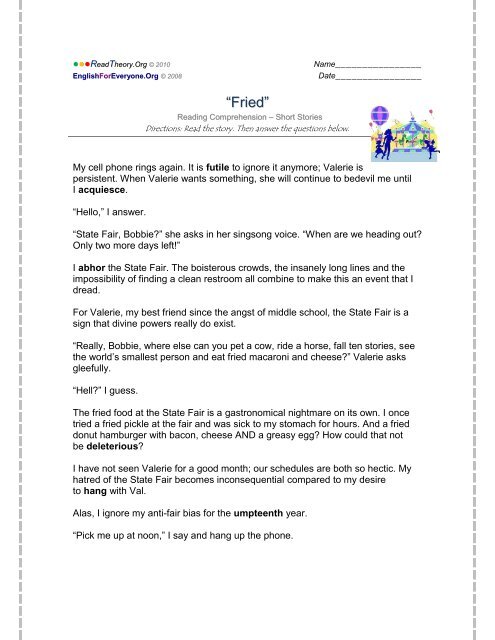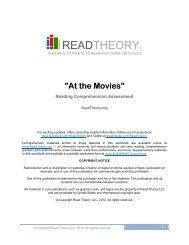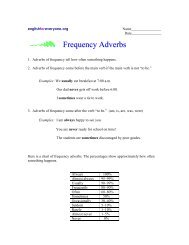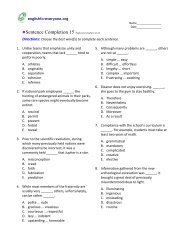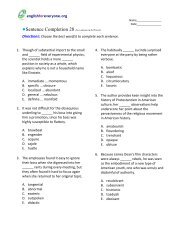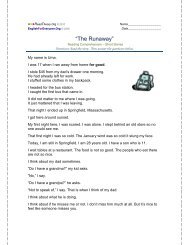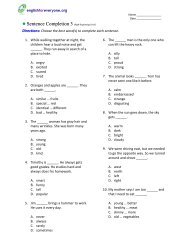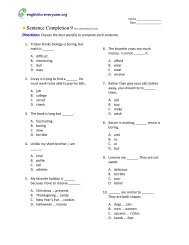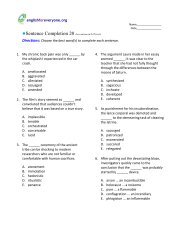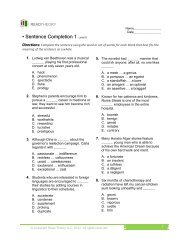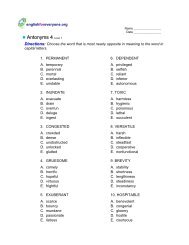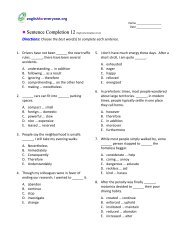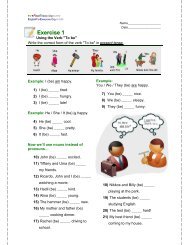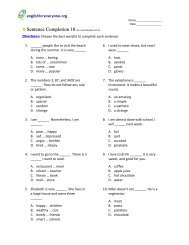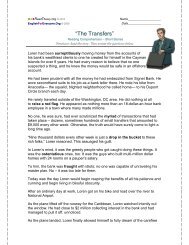You also want an ePaper? Increase the reach of your titles
YUMPU automatically turns print PDFs into web optimized ePapers that Google loves.
●●●ReadTheory.Org © 2010 Name________________<br />
<strong>English</strong>For<strong>Everyone</strong>.Org © 2008 Date________________<br />
<strong>“Fried”</strong><br />
Reading Comprehension – Short Stories<br />
Directions: Read the story. Then answer the questions below.<br />
My cell phone rings again. It is futile to ignore it anymore; Valerie is<br />
persistent. When Valerie wants something, she will continue to bedevil me until<br />
I acquiesce.<br />
“Hello,” I answer.<br />
“State Fair, Bobbie?” she asks in her singsong voice. “When are we heading out?<br />
Only two more days left!”<br />
I abhor the State Fair. The boisterous crowds, the insanely long lines and the<br />
impossibility of finding a clean restroom all combine to make this an event that I<br />
dread.<br />
For Valerie, my best friend since the angst of middle school, the State Fair is a<br />
sign that divine powers really do exist.<br />
“Really, Bobbie, where else can you pet a cow, ride a horse, fall ten stories, see<br />
the world’s smallest person and eat fried macaroni and cheese?” Valerie asks<br />
gleefully.<br />
“Hell?” I guess.<br />
The fried food at the State Fair is a gastronomical nightmare on its own. I once<br />
tried a fried pickle at the fair and was sick to my stomach <strong>for</strong> hours. And a fried<br />
donut hamburger with bacon, cheese AND a greasy egg? How could that not<br />
be deleterious?<br />
I have not seen Valerie <strong>for</strong> a good month; our schedules are both so hectic. My<br />
hatred of the State Fair becomes inconsequential compared to my desire<br />
to hang with Val.<br />
Alas, I ignore my anti-fair bias <strong>for</strong> the umpteenth year.<br />
“Pick me up at noon,” I say and hang up the phone.
Questions:<br />
1) As used in paragraph 1, which is<br />
the best synonym <strong>for</strong> futile?<br />
A. arduous<br />
B. enervating<br />
C. preposterous<br />
D. ineffective<br />
3) " I abhor the State Fair."<br />
Which of the following is the best<br />
way to rewrite the above sentence<br />
(from paragraph 4) while keeping its<br />
original meaning as used in the<br />
story?<br />
A. I really dislike the State Fair.<br />
B. I am bored by the State Fair.<br />
C. I have no time <strong>for</strong> the State Fair.<br />
D. I am uncertain about the State<br />
Fair.<br />
5) Logically speaking, which of the<br />
following might otherwise be<br />
included in Bobbie’s description of<br />
foods to be found at the state fair?<br />
I. fried candy bars<br />
II. candy apples<br />
III. ripe red tomatoes<br />
A. I only<br />
B. I and III<br />
C. II and III<br />
D. I, II, and III<br />
2) As used at in paragraph 1, what<br />
does it mean to acquiesce?<br />
A. to give in<br />
B. to speak kindly<br />
C. to pay attention<br />
D. to answer the phone<br />
4) According the passage, Valerie<br />
regards the state fair with<br />
A. ambivalence<br />
B. condescension<br />
C. jubilance<br />
D. nonchalance<br />
6) "And a fried donut hamburger with<br />
bacon, cheese AND a greasy<br />
egg?"<br />
Technically speaking, which of the<br />
following grammatical errors are<br />
committed in the above sentence<br />
from paragraph 8?<br />
I. There is no subject.<br />
II. There is no predicate.<br />
III. It is a sentence fragment.<br />
A. I only<br />
B. II only<br />
C. II and III<br />
D. I, II, and III
Questions (continued):<br />
7) Why might the author have chosen<br />
to capitalize all the letters in the<br />
word "AND" when writing about the<br />
donut hamburger in paragraph 8?<br />
A. to make sure the reader<br />
understood it was a list<br />
B. to show that a greasy egg was<br />
the last ingredient<br />
C. to highlight that the sentence<br />
was intentionally written<br />
incorrectly<br />
D. to emphasize how many<br />
ingredients were on the<br />
hamburger<br />
9) In paragraph 9, the word hang is<br />
used<br />
A. as a hyperbole, meaning an<br />
exaggeration<br />
B. as a slang expression, meaning<br />
in<strong>for</strong>mal language<br />
C. as an analogy, meaning a<br />
comparison between two things<br />
D. as a denotation, meaning the<br />
literal definition of a word<br />
8) As used in paragraph 8, which is<br />
the best antonym <strong>for</strong> deleterious?<br />
A. amicable<br />
B. beneficial<br />
C. <strong>for</strong>tuitous<br />
D. pathetic<br />
10) Near the end of the passage,<br />
what does the author's use of the<br />
word umpteenth suggest?<br />
A. the fair has been around <strong>for</strong> a<br />
long time<br />
B. this is the last time Bobbie will<br />
agree to go to the fair<br />
C. Bobbie goes to the State Fair<br />
with Val frequently<br />
D. this is the first time Bobbie has<br />
agreed to go with Val<br />
Would you like to attend the State Fair as described in the story? Explain.<br />
________________________________________________________________________<br />
________________________________________________________________________<br />
________________________________________________________________________<br />
________________________________________________________________________<br />
________________________________________________________________________<br />
________________________________________________________________________
Answers and Explanations<br />
1) D<br />
futile (adjective): having no useful result.<br />
In paragraph 1, Bobbie says, “My cell phone rings again. It is futile to ignore it<br />
anymore; Valerie is persistent. When Valerie wants something, she will<br />
continue to bedevil me until I acquiesce.” The reader can infer from this that<br />
Bobbie believes that Valerie will continue to bother Bobbie until Bobbie<br />
agrees to something. Since it is futile to ignore the phone because Valerie will<br />
simply continue to bother Bobbie, we can infer that futile means having no<br />
useful result, or ineffective. There<strong>for</strong>e (D) is correct.<br />
Something that is arduous demands great ef<strong>for</strong>t or labor. It does not appear<br />
difficult <strong>for</strong> Bobbie to ignore the phone. There<strong>for</strong>e (A) is incorrect. Something<br />
that is enervating is weakening. It does not weaken Bobbie to ignore the<br />
phone. There<strong>for</strong>e (B) is incorrect. Something preposterous is absurd or<br />
contrary to reason. Continuing to ignore the phone may not be successful, but<br />
it is not absurd. There<strong>for</strong>e (C) is incorrect.<br />
2) A<br />
acquiesce (verb): to consent or comply.<br />
In paragraph 1, Bobbie says, “Valerie is persistent. When Valerie wants<br />
something, she will continue to bedevil me until I acquiesce.” The reader can<br />
infer from this that Bobbie thinks that Valerie will keep on trying until Bobbie<br />
does what Valerie wants, so acquiesce means to give in or to comply.<br />
There<strong>for</strong>e (A) is correct.<br />
Valerie is persistent and wants Bobbie to agree to do something. Valerie is<br />
not waiting until Bobbie speaks kindly, she is waiting until Bobbie gives in.<br />
There<strong>for</strong>e (B) is incorrect. We know that Valerie is calling because Valerie<br />
wants something. Valerie must want Bobbie to do something more than<br />
merely pay attention. There<strong>for</strong>e (C) is incorrect. Bobbie says that Valerie will<br />
keep bothering Bobbie until she gives in when Valerie “wants something.” In<br />
this case, giving in means answering the phone, but in other, more general<br />
cases, giving in might mean something different. Answering the phone is too<br />
specific. There<strong>for</strong>e (D) is incorrect.<br />
3) A<br />
abhor (verb): to detest or regard with horror or loathing.<br />
Near the middle of the passage, Bobbie says, “I abhor the State Fair. The<br />
boisterous crowds, the insanely long lines and the impossibility of finding a<br />
clean restroom all combine to make this an event that I dread.” The reader<br />
can infer from this in<strong>for</strong>mation that Bobbie dreads the fair because of the<br />
crowds, long lines and dirty bathrooms. Since all of these things are bad, the<br />
reader can understand that to abhor the fair is to dislike the fair. There<strong>for</strong>e (A)<br />
is correct.
While Bobbie makes it clear that there are many things she does not like<br />
about the fair, Bobbie does not say that she wants to skip the fair because it<br />
would make her bored. There<strong>for</strong>e (B) is incorrect. Near the end of the<br />
passage, Bobbie says that her schedule is hectic. Bobbie says this to explain<br />
why she has not seen Valerie in a long time, not to explain why Bobbie does<br />
not want to go to the fair. The reasons she doesn’t want to go to the fair are<br />
the crowds, lines, and dirty bathrooms. There<strong>for</strong>e (C) is incorrect. Bobbie<br />
knows that she does not want to go to the fair. Bobbie is not uncertain.<br />
There<strong>for</strong>e (D) is incorrect.<br />
4) C<br />
In the middle of the story, Bobbie tells us that “<strong>for</strong> Valerie, my best friend<br />
since the angst of middle school, the State Fair is a sign that divine powers<br />
really do exist.” The phrase “a sign that divine powers really do exist” is used<br />
to express the idea that Valerie thinks that the fair is a special, wonderful<br />
event. Next, Valerie gleefully asks, “Really, Bobbie, where else can you pet a<br />
cow, ride a horse, fall ten stories, see the world’s smallest person and eat<br />
fried macaroni and cheese?” Since Valerie speaks about the events of the fair<br />
gleefully, the reader can infer that Valerie is excited about the fair. Jubilance<br />
is a feeling of extreme joy. Since Valerie is clearly excited about and looking<br />
<strong>for</strong>ward to the fair, we can say that Valerie regards the state fair with<br />
jubilance. There<strong>for</strong>e (C) is correct.<br />
Ambivalence means having conflicting feelings about something. Valerie<br />
seems to have nothing but positive feelings about the fair, so Valerie does not<br />
regard the fair with ambivalence. There<strong>for</strong>e (A) is incorrect. Condescension is<br />
regarding something with disdain. Since Valerie loves the fair, Valerie does<br />
not regard the fair with condescension. Bobbie regards the fair with<br />
condescension, but the question asks about Valerie’s opinion. There<strong>for</strong>e (B)<br />
is incorrect. Nonchalance is a casual lack of concern. Valerie does not lack<br />
concern <strong>for</strong> the fair – she is excited about the fair. There<strong>for</strong>e (D) is incorrect.<br />
5) A<br />
Near the end of the passage, Bobbie says, “The fried food at the State Fair is<br />
a gastronomical nightmare on its own. I once tried a fried pickle at the fair and<br />
was sick to my stomach <strong>for</strong> hours. And a fried donut hamburger with bacon,<br />
cheese AND a greasy egg? How could that not be deleterious to your<br />
health?” Bobbie describes the food at the state fair as mostly fried, decadent<br />
and especially bad <strong>for</strong> you. Fried candy bars sound especially decadent and<br />
unhealthy. This supports option (I). A candy apple is not unusually decadent<br />
or unhealthy. It also is not fried. This eliminates option (II). Ripe red tomatoes<br />
are actually healthy. This eliminates option (III). There<strong>for</strong>e (A) is correct.<br />
6) C<br />
Sentences are made up of two main components: the subject, which is the<br />
person or thing doing the action, and the predicate, which includes the verb<br />
and objects or phrases governed by the verb. For example, consider the<br />
sentence “The dog slept on the chair.” “The dog” is the subject, and “slept on
the chair” is the predicate. There<strong>for</strong>e, in the sentence “And a fried donut<br />
hamburger with bacon, cheese AND a greasy egg,” there is only a subject<br />
(the things listed). This eliminates option (I). There is no predicate because<br />
there is no verb. This supports option (II). Also, since complete sentences<br />
are made up of both a subject and a predicate, the fact that this sentence only<br />
has a subject means that it is a sentence fragment. This supports option (III).<br />
There<strong>for</strong>e (C) is correct.<br />
7) D<br />
Bobbie describes the food at the fair as a “nightmare.” Then, Bobbie<br />
describes the fried donut hamburger, asking, “How could that not be<br />
deleterious to your health?” Bobbie is trying to tell the reader that she dislikes<br />
the food at the fair because it is incredibly unhealthy. In order to do that,<br />
Bobbie emphasizes that not only is the burger fried, on a donut, with bacon<br />
and cheese – it also has a fried egg. Bobbie wants to emphasize to the<br />
reader that she found the number of unhealthy ingredients in the burger<br />
shocking. There<strong>for</strong>e (D) is correct.<br />
Bobbie is listing the ingredients. Capitalizing “and” does not emphasize the<br />
fact it is a list. The commas and the structure of the sentence already do that.<br />
There<strong>for</strong>e (A) is incorrect. The egg is the last ingredient on the list, whether<br />
Bobbie emphasizes it or not. There<strong>for</strong>e (B) is incorrect. The fact that the word<br />
“and” was emphasized did not draw attention to the fact that the sentence<br />
was a fragment, and thus grammatically incorrect. There<strong>for</strong>e (C) is incorrect.<br />
8) B<br />
deleterious (adjective): injurious to health; having a harmful effect.<br />
After listing the many unhealthy ingredients of a fried donut burger, Bobbie<br />
asks, “How could that not be deleterious?” Since the donut burger was clearly<br />
unhealthy, the reader can infer that the burger is harmful to your health.<br />
There<strong>for</strong>e, the word deleterious means harmful. An antonym <strong>for</strong> harmful is<br />
beneficial, or helpful. There<strong>for</strong>e (B) is correct.<br />
Amicable means friendly. Food cannot be friendly or unfriendly. There<strong>for</strong>e (A)<br />
is incorrect. Fortuitous means lucky. Lucky is not an antonym <strong>for</strong> harmful or<br />
deleterious. There<strong>for</strong>e (C) is incorrect. Something that is pathetic evokes pity<br />
or sympathy. Pathetic is not an antonym <strong>for</strong> deleterious. There<strong>for</strong>e (D) is<br />
incorrect.<br />
9) B<br />
hang (verb) (slang): to see someone socially.<br />
Near the end of the passage, Bobbie says, “I have not seen Valerie <strong>for</strong> a<br />
good month; our schedules are both so hectic. My hatred of the State Fair<br />
becomes inconsequential compared to my desire to hang with Val.” The<br />
reader can infer from these statements that Bobbie has not seen Valerie <strong>for</strong> a<br />
long time, and although Bobbie hates the fair, it doesn’t matter because
Bobbie wants to spend time with Valerie.” Hang is used as a slang expression<br />
here, meaning to spend time with Valerie. There<strong>for</strong>e (B) is correct.<br />
Hang is not used as an exaggeration here. There<strong>for</strong>e (A) is incorrect. There is<br />
no comparison between two things. There<strong>for</strong>e (C) is incorrect. The literal<br />
meaning of the word hang is to suspend with no support from below. Bobbie<br />
is talking about going to the fair with Valerie. Bobbie is not going to literally<br />
hang in the air with Valerie. There<strong>for</strong>e (D) is correct.<br />
10) C<br />
umpteenth (adjective) (slang): large number.<br />
Near the end of the passage, Bobbie says that she hasn’t seen Valerie in a<br />
long time and that Bobbie’s desire to hang with Valerie overrides Bobbie’s<br />
hatred of the fair. Bobbie says, “Alas, I ignore my anti-fair bias <strong>for</strong><br />
the umpteenth year.” The reader can infer from this in<strong>for</strong>mation that Bobbie<br />
is going to the fair, even though she dislikes it. Since Bobbie says that she is<br />
doing this <strong>for</strong> the “umpteenth” year, the reader can also infer that Bobbie has<br />
ignored her hatred of the fair in favor of seeing her friend many times be<strong>for</strong>e.<br />
There<strong>for</strong>e (C) is correct.<br />
Bobbie is ignoring her dislike of the fair <strong>for</strong> the umpteenth time, but that does<br />
not tell us how long the fair has been around. There<strong>for</strong>e (A) is incorrect.<br />
Although Bobbie does not like the fair, she has gone many times be<strong>for</strong>e and<br />
Bobbie is going to the fair now. Thus we have no reason to believe that this<br />
will be the last time. There<strong>for</strong>e (B) is incorrect. We know that Bobbie has<br />
agreed to go with Valerie to the fair <strong>for</strong> many years. There<strong>for</strong>e (D) is incorrect.


